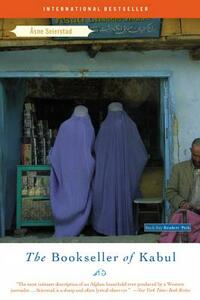Take a photo of a barcode or cover
Een verzameling van losjes verbonden verhalen die allen als een nachtkaars uitgaan....
An inside look at the daily life, customs and traditions of one family in Afghanistan. The story is written by a Norwegian journalist, who spent 4 months with the family.
Great storytelling and a very intimate view into an unconventional Afghan family. There were things that I could recognise from my own experiences and things that were so foreign and misogynistic that they scared me. I really love that the family members are portrayed in both their rights and wrongs, in both good and bad light, very objectively - I would despise Mansur in one moment and feel his joy under the rain in another. Great book overall!
This was the most depressing book I have read in a long time. Contrary to what the description on the back of the book would lead you to believe, The Bookseller of Kabul is not about books. It's about family life and culture in Afghanistan after the fall of the Taliban. I don't know what Afghanistan is like currently, several years after the original publication of this book, but I suspect the traditions which have kept women down for so long will be around for awhile.
powerful and emotional. i did sense a bit of snobbery towards the Afghan culture, but not too harsh. I liked the way she told the story through various characters in a very real and raw way. a very vivid and lyrically-written portrait of life in 2003 Kabul.
I think that this book was what I was looking for when I read [b:Kabul Beauty School: An American Woman Goes Behind the Veil|316558|Kabul Beauty School An American Woman Goes Behind the Veil|Deborah Rodriguez|http://photo.goodreads.com/books/1173713094s/316558.jpg|2893104]. This seems to be more behind the veil than that one.
I can understand how people could have problems with Seierstad's style, and she is being sued by the family in the book. Yet, the book is compelling and does make you think. I also feel that in some ways, perhaps without knowing that she is doing, Seierstad is making remarks upon families in general. True the west is more advanced, but there are still families that have gender inequality. So not only one family and one society, but gender in general.
I can understand how people could have problems with Seierstad's style, and she is being sued by the family in the book. Yet, the book is compelling and does make you think. I also feel that in some ways, perhaps without knowing that she is doing, Seierstad is making remarks upon families in general. True the west is more advanced, but there are still families that have gender inequality. So not only one family and one society, but gender in general.
I was looking forward to reading this as I don't know much about Afghanistan or the daily lives of people who live there and I do think it started out strong but somewhere along the way it lost itself. The jumping between family stories and information dumps about the history of Afghanistan was quite jarring, part of me wishes that the personal stories and the history lessons were separated.
It also became clear quite early on that the author took a lot of liberties when retelling people's thoughts and feelings, I understand that when writing about experiences that are not your own there does have to be some liberties taken, but there was almost too much detail when telling the reader things that the author simply would not know. I also felt that there was an almost constant undertone of judgement within the authors writing, to the point where certain parts were genuinely uncomfortable to read - not because of the content but because I could feel the authors opinions and judgements through her words. Which, for me, feels wrong. I think if you are to write a story about a culture that is not your own, you should be as judgement free as possible, especially when discussing such sensitive topics.
There were certain parts of the book that felt very invasive to me. Considering how important modesty and dignity is to Islam, there were multiple instances where the author described the women of the family in compromising positions, especially the older women, which felt incredibly disrespectful to me. Especially because, for the most part these passages contributed nothing to the story. For example, there was a long passage about how awful all the women smell, and then detailed descriptions of them bathing, only to then discuss how quickly the stink comes back. These particular details felt completely unnecessary and overly judgmental to me. There were also multiple mentions of how fat a lot of the women are - another disrespectful and unnecessary detail.
Also, something that I found quite interesting and did not find out until after finishing the book: the actual bookseller's family sued the author after publication for defamation. He himself wrote a book in response to the author's book and discussed how wrong her demonstration of Afghan life is.
It also became clear quite early on that the author took a lot of liberties when retelling people's thoughts and feelings, I understand that when writing about experiences that are not your own there does have to be some liberties taken, but there was almost too much detail when telling the reader things that the author simply would not know. I also felt that there was an almost constant undertone of judgement within the authors writing, to the point where certain parts were genuinely uncomfortable to read - not because of the content but because I could feel the authors opinions and judgements through her words. Which, for me, feels wrong. I think if you are to write a story about a culture that is not your own, you should be as judgement free as possible, especially when discussing such sensitive topics.
There were certain parts of the book that felt very invasive to me. Considering how important modesty and dignity is to Islam, there were multiple instances where the author described the women of the family in compromising positions, especially the older women, which felt incredibly disrespectful to me. Especially because, for the most part these passages contributed nothing to the story. For example, there was a long passage about how awful all the women smell, and then detailed descriptions of them bathing, only to then discuss how quickly the stink comes back. These particular details felt completely unnecessary and overly judgmental to me. There were also multiple mentions of how fat a lot of the women are - another disrespectful and unnecessary detail.
Also, something that I found quite interesting and did not find out until after finishing the book: the actual bookseller's family sued the author after publication for defamation. He himself wrote a book in response to the author's book and discussed how wrong her demonstration of Afghan life is.
Even if the people in the book were sometimes hard to keep apart and remember how they were conncected, this is a very good book. It is a good insight in how the complex culture in Afghanistan works and how its people are torn between their wants and what they feel they need to do.
This was okay. It was highly recommended, so I was looking forward to digging in. I'm not sure how accurate the description of life in Afghanistan is, but since it was written by a journalist who lived with an Afghanie family in order to write the book, i'll take her word for it. I think her description of life was so bleak--especially her depiction of woman's roles and destinies, along with a scathing, depressing take on Islam just really bummed me out on the whole book--and country.



